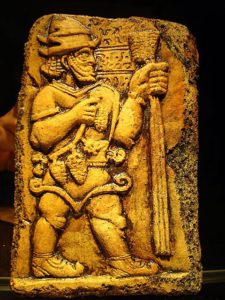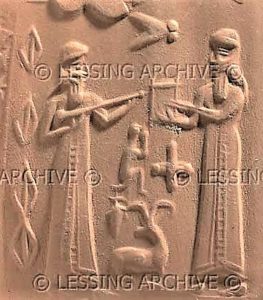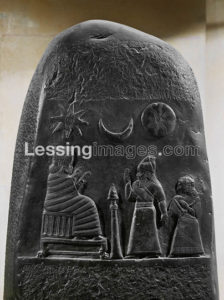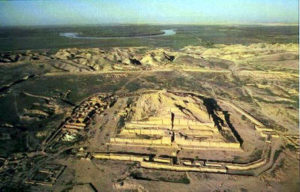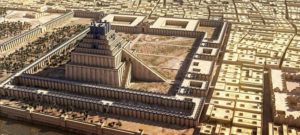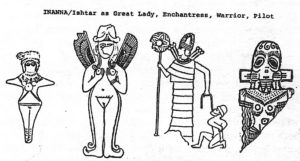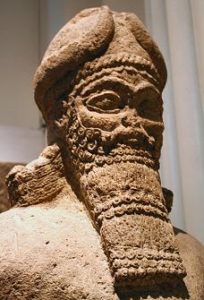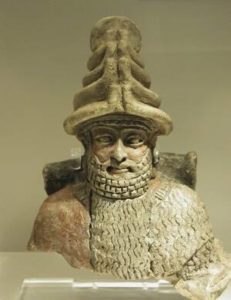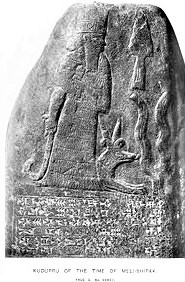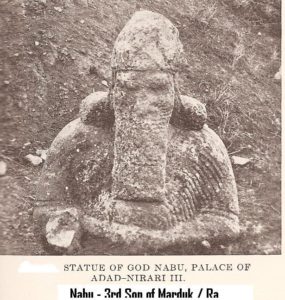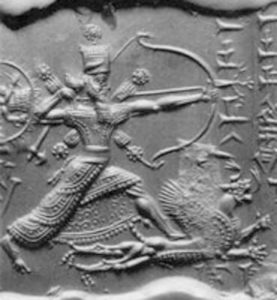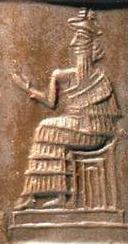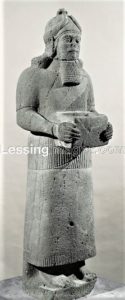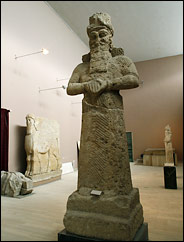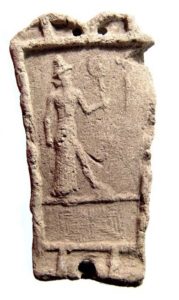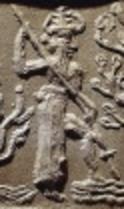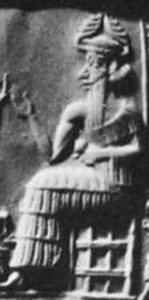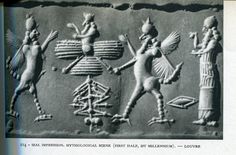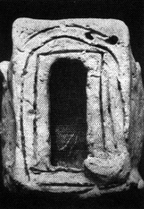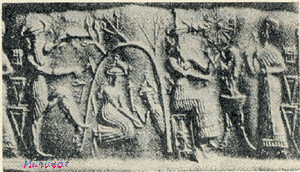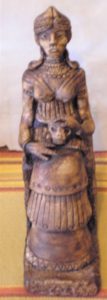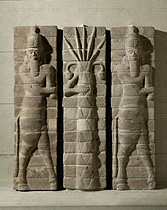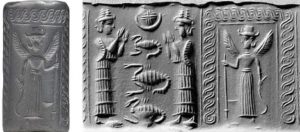“how Ereshkigal chose the Underworld”
Earth’s Ancient History
A Website dedicated to Ancient Times
(Texts: All Artefacts, Color Coding, & Writings in Bold Type With Italics Inside Parenthesis, are Added by Editor R. Brown, not the Authors, Translators, or Publishers!)
(gods in blue)
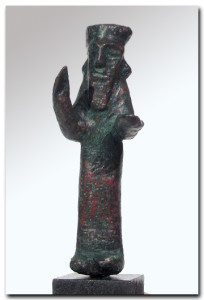 (Enlil)
(Enlil)
After Ki, Mother Earth and Queen, was separated by Enlil, Lord Air,
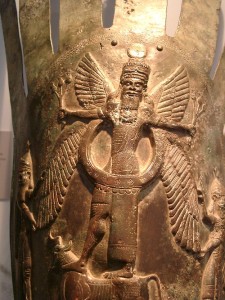
(An / Anu)
Master of Winds, their firstborn, from An (Anu), Sky father and King,
and the primal Unity of Heaven and Earth was forever lost,
in the Heights Above, An (Anu) wept for Ki,
longing for her embrace and kiss.
His heartfelt tears met Nammu the Sea.
She reached out for the Sky Lord, and Mother
and grieving son made for the first time sweet Love.
From the mingling of their bodies a Boy and a Girl,
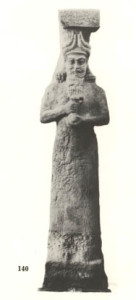
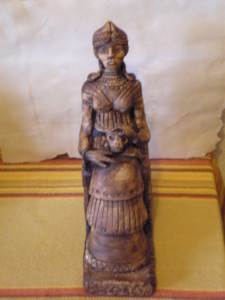
Divine Twins were born. Enki and Ereshkigal, they were called.
As time went by, Ereshkigal and Enki grew with the blessings of Creation’s dawn.
Curious and sometimes wise beyond their years,
brother and sister played especially in the Watery Deep of Nammu the Sea.
Enki would float here and there, whereas Ereshkigal swam and dived everywhere.
‘ Ereshkigal, I can’t see you! Come back to the surface, will you?
Why do you have to hide within the waters
when there is so much to see and do without?’ asked Enki with a sigh.
‘A rhetoric question, young brother, without doubt’,
countered Enlil amusedly from the shore,
where he kept watch over the Duku, the Holy Mound of Creation,
and Mother Ki, (sometimes Antu, sometimes Ninhursag)
his eyes gleaming with fond laughter.
‘Just let Ereshkigal be for a while.
At least I could do without her whys and wherefores for a minute or so!’
‘ I heard you, Big Brother!’ replied Ereshkigal.
She came out to the surface riding a wave,
and immediately put all her efforts together
to raise a mighty wall of splashing water towards the rock
where Enlil watched over the Earth and Enki’s floating body.
Both Enlil and Enki ran for cover.
They were going to succeed and escape Ereshkigal’s watery rage… perhaps this time?
“Not as yet”, thought Ereshkigal with a satisfied grin,
dripping with water and as fresh as the purest springs
of Mother Urash (sometimes Nammu, sometimes Ninhursag).
She sat by Enlil’s and Enki’s feet.
‘ So I ask too many questions, brothers of mine? Of course I do!
I want to Know and to Know I must ask first!
At least this is what I feel it should be!’
Ereshkigal ignored the resigned amusement of Enlil and Enki
and proceeded with confidence:
‘ There is a whole world within the Sea and I suspect in everything there is.
Moreover, there must be things beyond and below
I feel I should know, and I will, one day.
While you, Enlil, devise the Plans of Creation,
and you, Enki, busy yourself with forms and shapes these plans may take without,
I am concerned with the power within that binds these plans
and images together in combinations of all sorts.
I don’t know how to explain it, but I simply feel there is a refulgence within,
there is a Pattern that binds words and shapes together, beings and things,
and it is this pattern I want to know.
I will know. I just need to find out how.‘
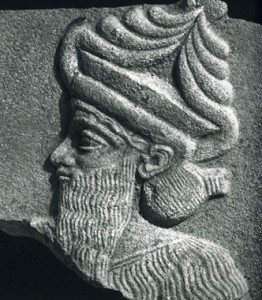
A fleeting shadow crossed Enlil’s smiling face.
‘I wish I saw things your way, Ereshkigal,
just to understand and explain the unexplained.
Take Kur, for example, and our dark little brothers and sisters
who followed him to the land’s end.
It is true Kur and the others looked different from us.
But why did they leave the safety of the Duku, the mound of creation,
why did they go beyond the Waters of Mother Nammu.’
‘ You are worrying about Kur and the Dark Guardians again, Enlil.
Why don’t you take them and Kur for what they are?
Whatever and wherever they are?’ asked Ereshkigal.
‘ Had you laid your eyes on Kur, you’d understand my concern.
He and the others are different from us, from our younger sisters and brothers. ‘
‘ But why should we all be the same, Older Brother?
Indeed, I believe we are all very, very different.
In Form and Essence, despite some Resemblance in Appearance.
I may be very wrong, Enlil, but I feel that if you keep fixing your eyes on but one thing,
you’ll miss out what could be the other side of the same thing.
Or person and being,’ remarked thoughtfully Ereshkigal.
‘ Wise words, little sister!
The point is that I take my Guardianship over the Earth too serious,’ agreed Enlil.
‘But there is something odd I cannot understand about Kur.
And I for sure wouldn’t like to visit the place where he chose to dwell either,
at the entrance of the Underworld,’ countered Enlil.
‘ I am sort of curious about these unknowable things.
And I don’t fear what I don’t know.
Even this Kur you don’t understand, Enlil.
Indeed, I am curious about Kur,’ replied Ereshkigal.
‘And where is this Underworld, by the way?’
‘ None have gone there yet’, answered Enki.
‘ It is beyond the edge of this world.
Mother Nammu says that it spreads itself as deep below
as the heights of Father An stretch above.’
‘ This sounds really interesting!
A whole new realm nobody has been to
or knows so much about!’ exclaimed Ereshkigal.
‘ O, sister, sometimes I wish you showed more respect for what you don’t know.
Just for safety’s sake’, supplied Enki.
‘ I am careful. And Inquisitive and Curious.
’ In her mind, Ereshkigal added silently
” even about this mysterious Kur and the Underworld”.
And so it was that Ereshkigal, the daughter of Nammu the Sea,
born of the bittersweet loss that the Sky father felt for Ki (Ninhursag),
twin Sister of Enki, (Ninhursag is Enki’s twin)
grew with the Desire to Know the Unknown and Reveal Patterns Unseen.
Everyday she would play with Enki, her Companion and Best of Friends,
and pester Enlil with countless questions.
Everyday Ereshkigal would dive into the deep waters of the Mother
and swim longer distances to resurface energized,
with more and more questions in her mind and a deeper resolve forming inside.
One day, Ereshkigal chose not to return to the Middle world.
This was the day she had found Kur (or he had found her perhaps?),
and the little dark half brothers and sisters of theirs.
They looked ugly and threatening, scattered over the edge of the world,
at the entrance of the Underworld.
They seemed to be lonely too, for all kept to their spaces,
alone and isolated, but looking pretty menacing.
Little dark half brothers and sisters ?,
So this must be a “wrong” and other creation of her mother Nammu with another God,
but maybe a experimental creation of the Gods.
” So much pain and loneliness, such rage and hunger for what they know not what.
Such desire to belong, but they know not where or how” ,
she thought, but didn’t say a word.
Faithful to herself, Ereshkigal didn’t flinch at Kur’s features
or at the misshapen faces of the dark little ones.
Yes, he did not look like any of the other Anunnaki Ereshkigal knew very well,
but this didn’t make him threatening to her.
Kur was… different.
Indeed, with his huge scaly body and wings, Primeval Snake and Dragon,
Ereshkigal felt he was like the raw power of Mother Ninhursag-Ki (Ninhursag).
A Beast, but she knew there was beauty within him…
Still, Ereshkigal l felt no fear for the Unknown
and a longing embrace it and make her it own.
‘ I am not afraid of you. Of any of you’ she said out loud, and she meant it.
‘ You are my half brother, Kur, and so are the dark little ones.
And somehow I feel there is beauty within you all,
even if you and others don’t have eyes to see. But I have.
Dive into your Essence, brother,
search for the seed that brought you, me and all into being.
I also came from that seed.
There you will find what unite us,
what make us One of a Kind with the One who is All Kinds.’
Thus she dived into the immensity of Kur’s anguish and loss,
for she accepted Kur for what he was, ugliness, pain,
rage and loneliness to find out his all whys.
‘ I vowed to challenge and fight to the very end
all who dared to fare to the world’s end,’ said Kur.
‘ And I take up the Challenge,’ answered Ereshkigal.
‘But I’ve travelled long and far to come to you.
You are a Challenge to me. I need to understand you.
And myself along the process.’
” Why are you doing this?”
Ereshkigal heard the question in her mind,
as she held Kur closer and closer to her own self.
” I myself don’t know very well why, but I simply need to.
Perhaps to grow in Understanding of who I am,
of who and what you and your own are.
To learn and Share, out of a Desire for Love and Healing
that comes from the bottom of my heart, mind, body and Soul.
And may this way, when I am wise about these things,
may I perhaps earn my crown in a brand new Realm, ‘ she replied loud and clear.
Kur’s features must have shown the equivalent to a smile,
for his voice sounded also light-hearted and interested.
‘ You are strange, half sister. I won’t fight you… as yet.
Tell me about this new realm
where you want to conquer your crown,’ said Kur, his curiosity stirred.
‘ How… I still must find out. Where…’
Ereshkigal turned round pointed at the distance,
where the Unknown lied yet unexplored.
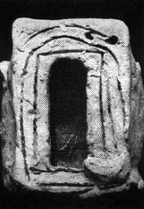
‘ There,’ she said, ’the Unknown, the Underworld, the Depths Within,
where Appearances don’t count, just Essence.
Perhaps I’ll go further by going deeper. Who knows?’
Kur came closer and closer still.
Ereshkigal kept her ground, just waiting.
So although he might think he was seizing her,
indeed it was she who had captured him.
To stretch his and her boundaries of being.
Heart pounding, but keeping very still outwards,
Ereshkigal felt her awareness grow as she experienced the wounds Kur had inside,
his desire to belong anywhere, to fit in.
Suddenly, she also realized how different she had always felt.
Even from Enki and Enlil, whom she loved with all her heart, mind and soul,
but who could never dive into the depths she longed to thread upon.
Ereshkigal sighed deeply, and glanced into the distance for a brief moment,
in the direction where Enlil and Enki sure were.
Maybe her Quest was another. She turned to Kur.
‘ What I will be from now on, I must discover’,
was her cryptic reply to Kur’s unspoken question,
but she knew he understood what she still was unable to say out loud.
‘ It may be a long task,’ Kur replied.
‘ Perhaps if I let each day bring what it has to offer,
and see what I can do with what it brings,
I will be able to accomplish something different.
To learn something different and grow likewise.
Will you do this with me?’
Thoughtfully, but with an engaging smile,
Ereshkigal stretched her hand to hold Kur’s scaly paw.
Together, they crossed the threshold to the Underworld.
Ereshkigal had always felt the pull to feel and experience the Unknown.
Now she chose to go where no one had gone before,
to stay in the uncharted realms of the Great Below,
to fill up its Emptiness with her Being.
Her voice then resonated loud and clear in all worlds of Creation,
Heights Above, Middle world, over the edge of the Earth and,
for the first time, echoed in the Depths Below:
‘ I claim the Realm of the Depths, the Underworld as my domain.’
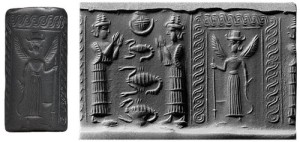 (Ereskigal in the Underworld)
(Ereskigal in the Underworld)
She had found her life’s Quest.
Not looking back, Ereshkigal crossed the threshold to the Below, never to come back.
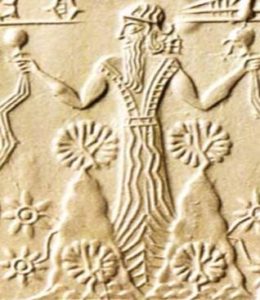 (Marduk, lord over Babylon & Egypt)
(Marduk, lord over Babylon & Egypt)
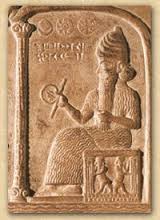
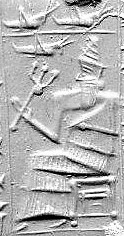
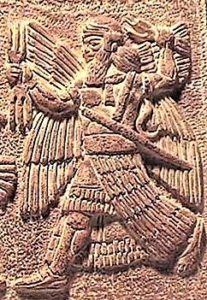
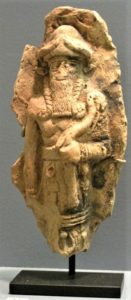
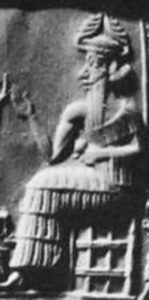
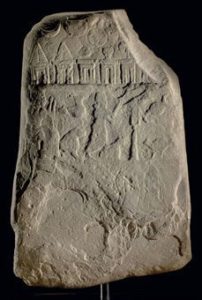
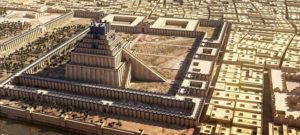
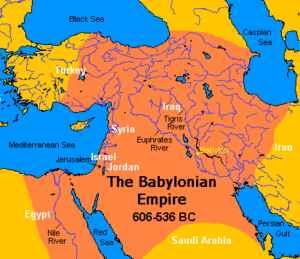
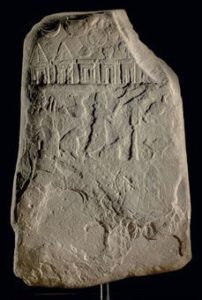 (
(